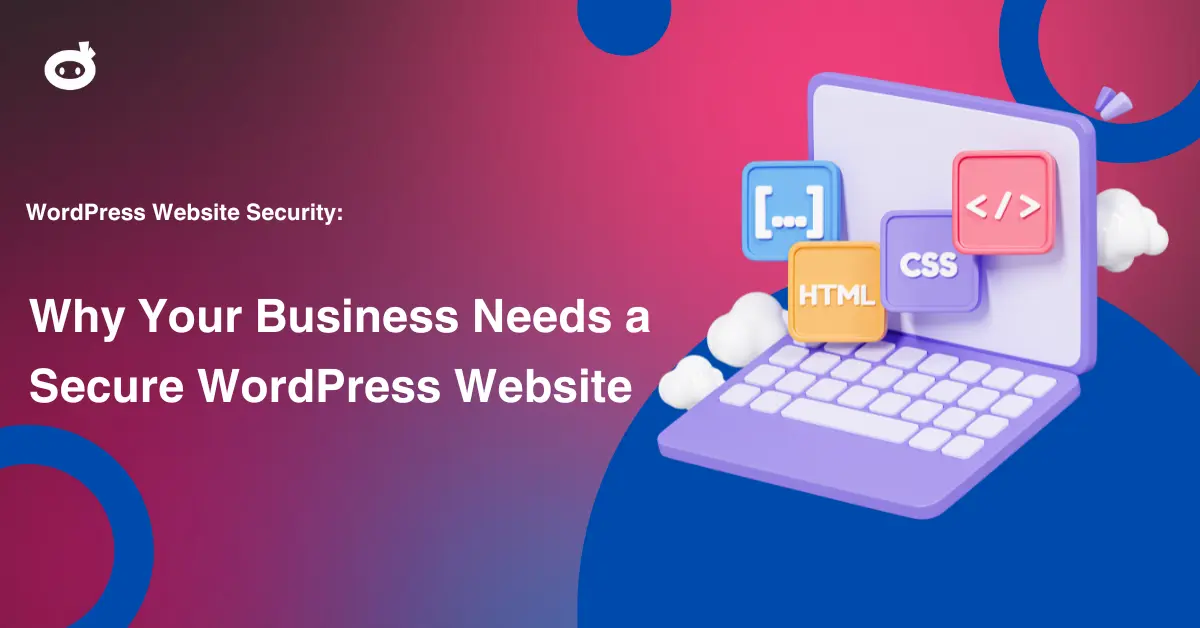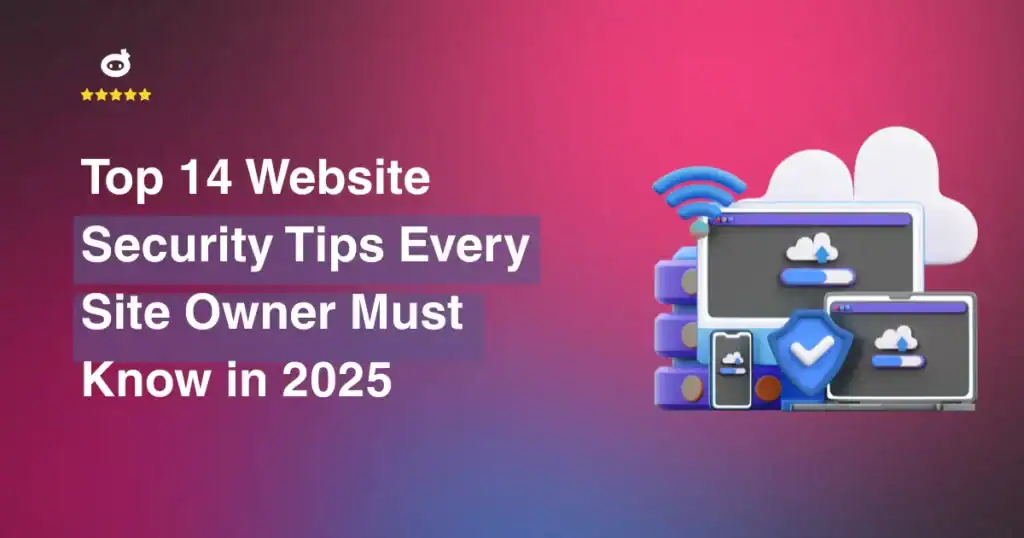A business website needs strong security to stay credible online.
WordPress, used by 40% of websites, is a popular and trusted platform. Yet, more and more entrepreneurs find themselves a target of online hackers on their WordPress websites.
WordPress is known for being not complex to use and flexibility. All things considered, because it is so famous, hackers love to target it. As a rule, many WordPress sites have been hacked because the themes and plugins are obsolete or the security measures aren’t strong enough.
Thus, beyond general security tips, this piece focuses on specific steps WordPress users can take to protect their sites. Customers’ private information and the business’s image are at risk if owners don’t ensure their WordPress website design has strong security features.
This content management system needs careful maintenance to keep it safe. If you choose WordPress for your small business, you can customize it and make it bigger without problems.
WordPress is free, very open, and backed by a large community, so it’s easy to see why people use it. Small to large businesses can make a responsive website that fits their needs with the help of security apps for WordPress and managed WordPress hosting.
However, understanding WordPress’s protection features is necessary to get the most out of it. You can use this help to protect your WordPress site and keep your small business safe and Secure WordPress Website.
Contents
- 1 Why WordPress Websites Are Popular Targets for Hackers
- 2 What Can Go Wrong: The Risks of an Insecure WordPress Website
- 3 Core Elements of a Secure WordPress Website
- 4 Tools and Plugins for WordPress Security
- 5 Advanced WordPress Security Measures
- 6 Why Investing in WordPress Security is Good for Business
- 7 Common Security Mistakes to Avoid
- 8 Conclusion
Why WordPress Websites Are Popular Targets for Hackers
WordPress is used by millions of business websites, even small ones because it is flexible and easy to use. But because it is open source and relies so much on styles and plugins, it has security holes. Many companies don’t maintain their WordPress sites, which leaves them open to cyberattacks, especially when changes or safe practices aren’t followed.
→ Open Source Nature:
The open-source nature of WordPress makes it best for developers worldwide, as it permits flexibility and adaptability for site improvement. This transparency can likewise cause vulnerabilities to crop up. Since WordPress’s source code is publicly accessible, malicious actors can identify weaknesses to exploit. Many business website owners, especially those running a small business website, underestimate the maintenance needed for an open-source platform, such as regular updates to WordPress plugins and themes or securing the WordPress installation.
Common Security Holes in WordPress:
1. Outdated Plugins and Themes
Obsolete WordPress themes and plugins are among the primary sources of security breaches. Research shows that obsolete plugins are taken advantage of in more than half of WordPress-related attacks, compromising sensitive information and the client experience of a business site. Research indicates that outdated plugins are exploited in over 50% of WordPress-related attacks, compromising sensitive data and the user experience of a business site. Small business owners often neglect timely updates, making their WordPress websites easy targets.
2. Poor Password Management
Brute force attacks targeting weak admin credentials are a common tactic. WordPress makes it easy for users to manage logins, but poor password practices can still leave a business website exposed. Implementing strong, unique passwords is essential to safeguard access to the WordPress dashboard.
3. Unpatched Core Issues
Unpatched vulnerabilities in the WordPress core are one more road for programmers. Routinely refreshing the center guarantees that security flaws are tended to speedily, upgrading the well-being of your WordPress platform and safeguarding your online presence.
→ WordPress and the Plugin Dependency:
While WordPress plugins enhance functionality, they also introduce risks. Third-party plugins can act as entry points for hackers if poorly coded or outdated. Using reliable tools like WP Security Ninja ensures plugins are secure. This tool helps small business owners mitigate risks while preserving the benefits of using WordPress, such as scalability and flexibility in website design.
→ Real-World Example of a Hack:
A striking WordPress breach happened in 2018 when a weakness in a famous plugin prompted many business sites to be seized in a DDoS attack. The episode featured the essential requirement for strong security practices, regular updates, and secure WordPress hosting to safeguard against such dangers.
What Can Go Wrong: The Risks of an Insecure WordPress Website
Small businesses relying on WordPress for their online presence could disrupt the guidelines, get punished via search engines, and lose money. To safeguard your site from these risks, you should utilize trusted WordPress modules and subjects to guarantee it is secure.
→ Loss of Customer Trust:
A WordPress site that has been hacked can seriously harm customer trust, particularly for small businesses. Credit card information breaches and malware make clients move away from business sites, which costs them cash and damages the brand’s picture. Strikingly, 65% of individuals who have been victims of an information breach say they never again trust the organization after the hack. This shows how important it is to keep website security strong.
→ Financial Implications of Hacking:
The financial repercussions of a hacked business website are substantial. Direct costs include restoration expenses, legal fees, and immediate loss of business. Indirect losses encompass decreased sales, operational downtime, and potential SEO penalties. The average cyberattack cost for small companies has escalated to $20,752 per incident, underscoring the necessity for proactive security measures to mitigate such financial risks.
→ Compliance Risks and Legal Repercussions:
Regulations like GDPR and CCPA say that companies must keep customer info safe. A data breach can result in harsh fines, lawsuits, and compliance violations, which makes the need for strong security procedures even stronger. Not following the rules can cost you money and hurt your customer’s reputation. That’s why following the rules is vital for keeping your business going.
→ Impact on SEO and Search Rankings:
Hackers can damage a WordPress site’s SEO by lowering its search results or removing it from search engine indexes. Google actively marks websites as having security holes, which reduces organic traffic and makes healing times longer. It can take months to fix a site’s SEO after a breach, which means the business may not be as visible online or as engaged with customers.
Core Elements of a Secure WordPress Website
A secure WordPress website relies on strong foundations, including regular updates for WordPress themes, plugins, and the core platform. Using reliable WordPress hosting enhances security while implementing strong password practices and firewalls further protect the site.
Small businesses must prioritize these measures to safeguard their content management system and online presence.
1. Strong Password Practices
A secure WordPress website begins with strong, unique passwords for administrators, users, and databases. Passwords should include at least 12 characters, mixing special symbols, numbers, and random letters for added complexity. Using a password manager simplifies password generation and storage, improving ease of use.
To protect their WordPress sites and online presence, small business owners must adopt these measures for customer confidence and operational stability.
2. Two-factor authentication (2FA)
Adding Two-Factor Authentication (2FA) significantly strengthens the security of your WordPress website. This simple step ensures that only authorized users can access the admin area. Tools like Google Authenticator can integrate seamlessly with your WordPress site. Set up 2FA by installing a WordPress plugin, enabling the feature, and linking it to your account, enhancing your website without compromising user experience.
3. Regular Software Updates
Keeping WordPress updated is key to protecting your site, as updates patch security flaws in the core system, themes, and plugins.
Businesses of all sizes can benefit from automated updates, while manual checks ensure compatibility. Tools like WP Security Ninja streamline the process, helping companies keep their online presence secure and up-to-date.
4. SSL Certificates and HTTPS
An SSL certificate is essential for any WordPress website, ensuring secure data transmission and boosting SEO rankings. Customers trust HTTPS websites more, leading to increased engagement.
Without SSL encryption, sensitive data can be intercepted, damaging a business’s reputation. Managed WordPress hosting services often include SSL certificates, making enhancing your website development and safeguarding your WordPress platform easy.
5. Secure Hosting Environment
Choosing a secure hosting provider is critical for a WordPress website. Reliable hosting ensures data encryption, uptime monitoring, and regular backups to prevent data loss. Managed WordPress hosting is particularly valuable for small business websites, offering features tailored to the WordPress platform.
These services ensure a responsive website optimized for security and performance, even as your business grows.
6. Regular Backups
Regular backups protect your WordPress website from data loss due to hacks or technical issues. Small business website owners can use plugins like UpdraftPlus or hosting services that offer daily backups. Regular backups enable quick restoration of a WordPress site, reducing downtime and safeguarding your content management system, ensuring a seamless online presence for businesses of all sizes.
Tools and Plugins for WordPress Security
WordPress offers tools and plugins to safeguard your website. Use Wordfence, Sucuri, or iThemes Security for advanced protection. These WordPress plugins integrate seamlessly with your WordPress dashboard, ensuring your website remains secure.
Small business websites benefit from features like malware scanning and firewall protection, enhancing their online presence and user experience effortlessly.
→ Security Plugins Overview:
Wordfence, Sucuri, and iThemes Security are basic instruments for getting your WordPress site. These plugins highlight things like firewalls, malware examination, and login insurance. WordPress coordinates consistently with these tools, making it simple for organizations to safeguard their internet-based presence. Their ease of use and support from the WordPress community enhance website security effectively.
→ Backup Plugins:
Plugins like UpdraftPlus and VaultPress are vital for automated backups, ensuring comprehensive security for your WordPress website. These tools allow businesses to restore their data quickly in emergencies.
Many WordPress plugins integrate security and backup solutions, streamlining website management. WordPress is a fantastic platform for building a safe and mobile-friendly site.
→ Web Application Firewalls (WAF):
WAFs shield your WordPress site from DDoS attacks, brute-force attacks, and malware. WP Security Ninja’s underlying firewall feature ensures your site is protected. WordPress supports advanced security protocols, making it the right platform for businesses.
These features help companies of all sizes maintain a professional-looking website resilient to threats.
→ Regular Security Audits:
Routine security audits with tools like WPScan or WP Security Ninja are essential for maintaining a secure WordPress website. These audits identify vulnerabilities, ensuring your website stays protected. WordPress developers and businesses benefit from these proactive measures.
The power of WordPress, combined with regular audits, makes WordPress inherently secure and ideal for an online business.
Advanced WordPress Security Measures
Advanced security measures for WordPress websites include implementing strict server-level security configurations, disabling XML-RPC to prevent brute-force attacks, and limiting login attempts.
WordPress is flexible, allowing businesses to enhance security with plugins and firewalls. Regular monitoring and advanced encryption techniques ensure your website remains protected, offering a strong online presence.
→ Security Hardening Best Practices:
Security hardening for your WordPress website involves advanced techniques like hiding the WordPress login page, disabling XML-RPC, and securing the wp-config.php file. These methods significantly reduce vulnerabilities, preventing brute-force attacks and unauthorized access.
Businesses can implement these measures to enhance their website’s security. WordPress also offers numerous plugins to simplify this process, ensuring your business website remains protected and resilient against cyber threats.
→ Server-Side Security:
Server-side security is fundamental to safeguarding your WordPress site. Businesses can mitigate risks, for example, DDoS attacks and unauthorized access, by restricting admittance to essential records and catalogs, utilizing secure conventions like SSH for logins, and carrying out SFTP for document transfers.
Server configurations improve WordPress’s security, making your site safer and less vulnerable to malicious activities. WordPress provides tools to manage server-side settings efficiently, contributing to a strong online presence.
→ Intrusion Detection & Prevention Systems (IDPS):
Intrusion Detection & Prevention Systems (IDPS) are critical in proactively monitoring your WordPress website for suspicious activity. These systems detect potential threats, including brute-force attacks, and block malicious behavior before it escalates.
WordPress supports integration with various IDPS solutions, offering a protection layer for businesses. By implementing IDPS, you can ensure your website remains secure against hackers and malicious intrusions, reinforcing your site’s defenses.
→ Penetration Testing:
Penetration testing is a proactive method businesses can use to identify vulnerabilities in their WordPress websites before hackers exploit them.
By conducting regular tests, you can pinpoint weaknesses in your website’s security, including outdated plugins or misconfigurations. WordPress development offers tools for testing site security.
A well-conducted penetration test will help businesses strengthen their WordPress site against future threats, ensuring that security measures remain strong and current.
Why Investing in WordPress Security is Good for Business
Securing your WordPress website with adequate resources is important for securing vital information, protecting customers’ trust, and ensuring the continuity of the business.
A safe website avoids cyber attacks, prevents potential downtimes, and enhances the business’ reputation—an invaluable asset—which is particularly significant in protecting resources and inspiring long-term development for small businesses.
→ Return on Investment (ROI) of Website Security:
Early investment in security for your WordPress website helps mitigate risks, shielding businesses from breaches, financial losses, and unnecessary downtime. WordPress provides multiple security plugins that help protect your business.
A secure website strengthens your reputation, minimizing the potential financial losses and ensuring long-term growth for your online business.
→ Security as a Competitive Advantage:
Businesses with secure WordPress websites gain customer trust, improve conversion rates, and stand out in competitive markets. A website builder with robust security features enhances the customer experience, giving you an edge.
WordPress allows businesses to integrate strong security features seamlessly, ensuring visitors feel confident. A secure site becomes a key differentiator in attracting and retaining customers.
Common Security Mistakes to Avoid
Common security mistakes include using weak passwords, neglecting software updates, and not implementing HTTPS. Many WordPress users fail to install security plugins or back up their websites regularly.
These mistakes expose businesses to vulnerabilities, risking data breaches and loss. Consistently updating security protocols ensures a safer online presence.
→ Ignoring Updates and Patches:
Regularly updating WordPress, plugins, and themes is crucial for maintaining website security. WordPress provides frequent updates to fix vulnerabilities, and keeping everything up-to-date ensures your website remains protected. Failing to update can expose businesses to security breaches, making it essential to keep your website secure and reliable.
→ Using Weak or Repeated Passwords:
Weak or reused passwords are common targets for hackers. A strong password is essential for securing your WordPress website. Avoiding weak passwords is critical for your business website’s safety. Using a password manager or multi-factor authentication can help secure your site and prevent attacks on your online business.
→ Relying on a Single Security Layer:
A single security layer, say a firewall or plugin isn’t enough to protect the WordPress site. Instead, combining several layers of protection—like firewalls, hosting security, and secure login protection—provides a stronger defense. This multi-layered approach ensures that your website remains safe against many threats.
→ Choosing Poor Hosting Providers:
A poor hosting provider may end up exposing your WordPress site to attacks. Advanced security features are not often supported in shared hosting. As such, it is of utmost importance to ensure a reliable hosting provider that integrates security features. Extra protections include hosting solutions offering DDoS protection, backups, and SSL certificates.
→ Neglecting Backups:
If you overlook backups, a malware or ransomware attack could leave you with no way to restore your WordPress site. Consistent backups are key to quick recovery in emergencies. Using reliable backup plugins ensures your online business remains safe, and your data is recoverable, hence preventing long-term damage from attacks.
Conclusion
In conclusion, locking down your WordPress website isn’t just a smart move—it’s a business necessity. WordPress remains one of the best platforms for businesses to build websites, offering flexibility, scalability, and a vast selection of plugins and themes.
Its easy setup, mobile-friendly designs, and the support of a large WordPress community make it wildly popular among businesses. By prioritizing website security and implementing best practices like regular updates, strong passwords, multi-layered security, and reliable backups, you build a foundation for long-term success, enabling your business to grow without fear of data breaches.
Take action today by securing your WordPress website with trusted security solutions. WP Security Ninja is a valuable partner, providing comprehensive protection and peace of mind for businesses looking to safeguard their online presence.
Protect your WordPress for your business website now and ensure your digital assets are secure for the future.
Written by Lars Koudal









